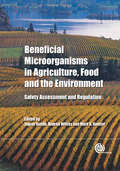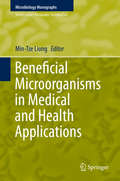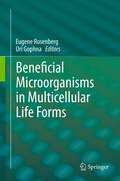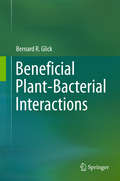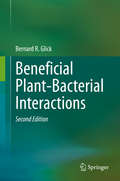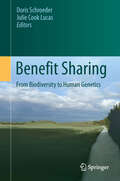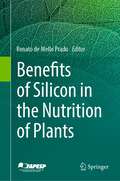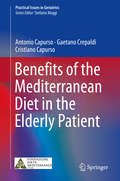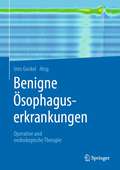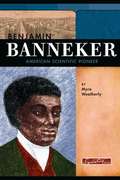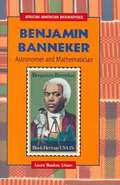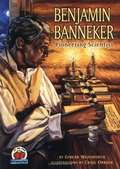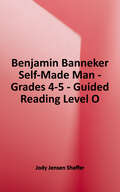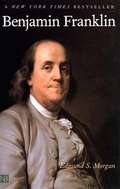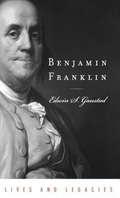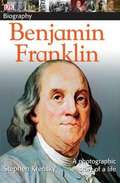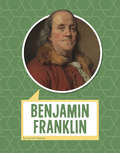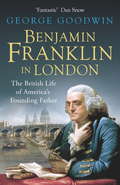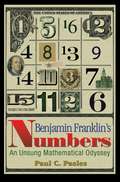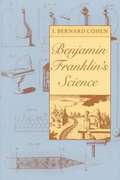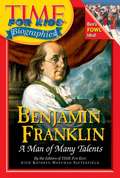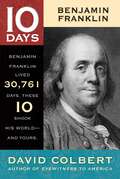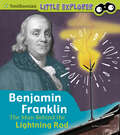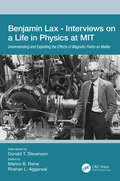- Table View
- List View
Beneficial Microorganisms in Agriculture, Food and the Environment
by Atte Von Wright Stephen Jaronski Carl-Gustaf Thornstrom Andrea Wilcks Keith Warner Ingvar Sundh Stephen Wessels Avrelija Cencic Milton Typas Barbara Pernfuss Roland Mollby Niels Hendriksen John Howieson Rudiger Hauschild Peter Van Baarlen Anne Madsen Michael Frodyma C Kurz Claude Alabouvette Mark Goettel Trudy Wassenaar Jeroen Meussen Harry Evans Gregorio Loprieno Andrew Chesson Michael WisniewskiMicroorganisms are widely used in various beneficial applications, including food, pest control, bioremediation, biodegradation, biofuel processes, and plant symbiosis and growth stimulation. his book provides an overview of the available methodology for safety assessments of microorganisms, including determination of their infectivity and whether they produce toxic or sensitising substances. Also covered are the regulatory systems in risk assessment and management of microbial products, quarantine legislations, international treaties, the importance of public risk perception and risk reduction behaviour.
Beneficial Microorganisms in Medical and Health Applications (Microbiology Monographs #28)
by Min-Tze LiongThis volume is devoted to the application of microorganisms in medical treatment and health protection. Topics discussed include the role of probiotics in immune modulation, in prevention of influenza, and in atopic dermatitis. Further chapters cover aspects such as the relation of the gut microbiome and stress, the immune system, the regulation of inflammation, the benefits of Bifidobacterium for infants, and bacteriocin in medical applications, as well as the use of in vitro models of the gastrointestinal tract, omics approaches for targeting microbial health potential and the production of hepatitis B vaccines. This volume will be of particular interest to scientists working in the fields of clinical medicine, applied microbiology, pharmacy and public health.
Beneficial Microorganisms in Multicellular Life Forms
by Eugene Rosenberg Uri GophnaAll animals and plants form associations with hundreds or thousands of different beneficial microorganisms. These symbiotic microbes play an important role in the development, adaptation, health and evolution of their hosts. This book brings together a group of diverse biologists to discuss microbial interactions with multicellular life forms including insects, corals, plants, and mammals, including humans. The various mechanisms by which microorganisms benefit their hosts are discussed, including providing essential nutrients, preventing disease, inducing the immune system, and combating stress. Since the microbiota can be transferred from parent to offspring, it plays an important role in the origin and evolution of animal and plant species. This book should be of interest to the widest range of biological scientists, merging the studies of host and microbial physiology, symbiosis, and the ecology and evolution of symbiotic partners.
Beneficial Plant-Bacterial Interactions
by Bernard R. GlickThis monograph provides an overview of beneficial plant-bacterial interactions in a straightforward and easy-to-understand format, and includes a wealth of unique illustrations elaborating every major point. Study questions that emphasize the key points are provided at the end of each chapter. One way to feed all of the people in the world's growing population is through the increased use of plant-growth-promoting bacteria in agriculture. These bacteria not only directly promote growth but also protect plants against a wide range of biotic and abiotic stresses. Moreover, they can be used to support procedures for biologically cleaning up the environment. Plant-growth-promoting bacteria are already being used successfully on a small scale in several countries, and as this technology matures, the world may witness a major paradigm shift in agricultural practice.
Beneficial Plant-Bacterial Interactions
by Bernard R. GlickThis book provides a straightforward and easy-to-understand overview of beneficial plant-bacterial interactions. It features a wealth of unique illustrations to clarify the text, and each chapter includes study questions that highlight the important points, as well as references to key experiments. Since the publication of the first edition of Beneficial Plant-Bacterial Interactions, in 2015, there has been an abundance of new discoveries in this area, and in recent years, scientists around the globe have begun to develop a relatively detailed understanding of many of the mechanisms used by bacteria that facilitate plant growth and development. This knowledge is gradually becoming an integral component of modern agricultural practice, with more and more plant growth-promoting bacterial strains being commercialized and used successfully in countries throughout the world. In addition, as the world’s population continues to grow, the pressure for increased food production will intensify, while at the same time, environmental concerns, mean that environmentally friendly methods of food production will need to replace many traditional agricultural practices such as the use of potentially dangerous chemicals. The book, intended for students, explores the fundamentals of this new paradigm in agriculture, horticulture, and environmental cleanup.
Benefit Sharing: From Biodiversity to Human Genetics
by Doris Schroeder Julie Cook LucasBiomedical research is increasingly carried out in low- and middle-income countries. International consensus has largely been achieved around the importance of valid consent and protecting research participants from harm. But what are the responsibilities of researchers and funders to share the benefits of their research with research participants and their communities? After setting out the legal, ethical and conceptual frameworks for benefit sharing, this collection analyses seven historical cases to identify the ethical and policy challenges that arise in relation to benefit sharing. A series of recommendations address possible ways forward to achieve justice for research participants in low- and middle-income countries.
Benefits of Silicon in the Nutrition of Plants
by Renato de Mello PradoThis book aims to describe the role of silicon in the environment from the biogeochemical cycle of terrestrial ecosystems, uptake to cellular and tissue bioaccumulation and its effects in mitigating abiotic and biotic stresses. From an agronomic point of view, this knowledge is essential to boost agricultural production and improve its quality and the sustainability of crops in the face of the growing pressure of different stresses on crop systems of different natures. Si is the only multi-stress mitigator in plant nutrition. It plays an important role in mitigating nutritional deficiency by increasing nutrient use efficiency, something that will be very important in the future: producing more with less nutrient accumulated in the plant. The book focuses on the effects of Si on plant mineral nutrition, exploring nutritional deficiencies and toxicity of Al and potentially toxic heavy metals such as Cd, as well as important stresses such as salinity, water deficit and high temperature. The book will also discuss the Si extractors in the soil and criteria for recommending Si in crops and the sources of the element for its application in soil and leaves, as well as the role of Si in the activity of microorganisms and in plant diseases and pests. São Paulo Research Foundation (FAPESP)(2022/10092-9).
Benefits of the Mediterranean Diet in the Elderly Patient (Practical Issues in Geriatrics)
by Antonio Capurso Gaetano Crepaldi Cristiano CapursoThis book illustrates the role of Mediterranean diet in connection with well-being and particularly its impact on health and elderly care, as well as on the mechanisms of aging. Aging is a natural process of human life. The knowledge that a healthy dietary regimen like the Mediterranean diet can effectively prevent or delay many diseases typically affecting aging people may help to better manage the aging process. From this point of view, knowledge of the numerous benefits of the Mediterranean-style diet may effectively promote better management of the burden of elderly care.As early as the 1950s, Ancel Keys pointed out the effectiveness of the Mediterranean diet in helping to control, and possibly avoid, myocardial infarction and/or cholesterol metabolism. Quite soon after the first studies were published, it became clear that the Mediterranean diet was beneficial not only in connection with cardiovascular disease but also many other diseases, from diabetes to hypertension, from cancer and thrombosis to neurodegenerative diseases, including dementia. Examining those benefits in detail, this book offers a valuable educational tool for young professionals and caregivers, as well as for students and trainees in Geriatrics and Nutrition.
Benigne Ösophaguserkrankungen: Operative und endoskopische Therapie
by Ines GockelExperten für die jeweilige Thematik stellen systematisch den Wissensstand zur Pathogenese der verschiedenen benignen Erkrankungen der Speiseröhre, das empfohlene diagnostische Vorgehen und die Therapiemöglichkeiten dar. Detailliert beschreiben sie Auswahl, Durchführung und Ergebnisse der einzelnen endoskopischen und operativen Verfahren, zahlreiche Abbildungen veranschaulichen das Vorgehen. Neben der Ösophagusachalasie, der gastroösophagealen Refluxerkrankung und den verschiedenen Divertikeln sind auch benigne Tumoren, die Barrett-Dysplasie und traumatische Perforationen berücksichtigt.
Benjamin Banneker: American Scientific Pioneer
by Myra S. WeatherlyA biography profiling the life of scientist and mathematician Benjamin Banneker. Includes source notes and timeline.
Benjamin Banneker: Astronomer and Mathematician
by Laura Baskes LitwinExplore both the personal and professional lives of this exemplary scientist and mathematician.
Benjamin Banneker: Astronomer and Scientist
by Margaret Goff ClarkA biography of Benjamin Banneker, a black astronomer and scientist.
Benjamin Banneker: Pioneering Scientist
by Ginger WadsworthIntroduces Benjamin Banneker, a free black man of the eighteenth century who loved to learn and used his knowledge and observations to build a wooden clock, write an almanac, and help survey the streets of Washington. D.C.
Benjamin Banneker: Self-Made Man
by Jody Jensen ShafferThe Primary Source Readers series will ignite students' interest in history through the use of intriguing primary sources. This nonfiction reader features purposefully leveled text to increase comprehension for different learner types. Students will learn about the life of Benjamin Banneker, the self-educated African American man who became an important land surveyor and almanac writer. Text features include captions, a glossary, and an index to help build academic vocabulary and increase reading comprehension and literacy. This book prepares students for college and career readiness and aligns with state standards including NCSS/C3, McREL, and WIDA/TESOL.
Benjamin Franklin
by Edmund Sears MorganShort biography of Benjamin Franklin by a historian who has numerous books to his credit along with numerous awards.
Benjamin Franklin
by Edwin S. GaustadThe tenth and youngest son of a poor Boston soapmaker, Benjamin Franklin would rise to become, in Thomas Jefferson's words, "the greatest man and ornament of his age. " In this short, engaging biography, historian Edwin S. Gaustad offers a marvelous portrait of this towering colonial figure, illuminating Franklin's character and personality. Here is truly one of the most extraordinary lives imaginable, a man who, with only two years of formal education, became a printer, publisher,postmaster, philosopher, world-class scientist and inventor, statesman, musician, and abolitionist. Gaustad presents a chronological account of all these accomplishments, delightfully spiced with quotations from Franklin's own extensive writings. The book describes how the hardworking Franklin became at age 24 the most successful printer in Pennsylvania and how by 42, with the help of Poor Richard's Almanack, he had amassed enough wealth to retire from business. We then follow Franklin's nextbrilliant career, as an inventor and scientist, examining his pioneering work on electricity and his inventions of the Franklin Stove, the lightning rod, and bifocals, as well as his mapping of the Gulf Stream, a major contribution to navigation. Lastly, the book covers Franklin's role as America's leading statesman, ranging from his years in England before the Revolutionary War to his time in France thereafter, highlighting his many contributions to the cause of liberty. Along the way, Gaustad sheds light on Franklin's personal life, including his troubled relationship with his illegitimate son William, who remained a Loyalist during the Revolution, and Franklin's thoughts on such topics as religion and morality. Written by a leading authority on colonial America, this compact biography captures in a remarkably small space one of the most protean lives in our nation's history.
Benjamin Franklin (Biographies)
by Laura K. MurrayHow much do you know about Benjamin Franklin? Find out the facts you need to know about this Founding Father, author, and inventor. You'll learn about the early life, challenges, and major accomplishments of this important American.
Benjamin Franklin in London: The British Life of America's Founding Father
by George Goodwin'Sensitive, moving and finely textured' Guardian'Fantastic' Dan SnowFor the great majority of his long life, Benjamin Franklin was a loyal British royalist. In 1757, having made his fortune in Philadelphia and established his fame as a renowned experimental scientist, he crossed the Atlantic to live as a gentleman in the heaving metropolis of London. With just a brief interlude, a house in Craven Street was to be his home until 1775. From there he mixed with both the brilliant and the powerful, whether in London coffee house clubs, at the Royal Society, or on his summer travels around the British Isles and continental Europe. He counted David Hume, Matthew Boulton, Joseph Priestley, Edmund Burke and Erasmus Darwin among his friends, and as an American colonial representative he had access to successive Prime Ministers and even the King.The early 1760s saw Britain's elevation to global superpower status with victory in the Seven Years War and the succession of the young, active George III. These two events brought a sharp new edge to political competition in London and redefined the relationship between Britain and its colonies. Though Franklin long sought to prevent the break with Great Britain, his own actions would finally help cause that very event. On the eve of the American War of Independence, Franklin fled arrest and escaped by sea. He would never return to London. With his unique focus on the fullness of Benjamin Franklin's life in London, George Goodwin has created an enthralling portrait of the man, the city and the age.
Benjamin Franklin's Numbers: An Unsung Mathematical Odyssey
by Paul C. PaslesFew American lives have been as celebrated--or as closely scrutinized--as that of Benjamin Franklin. Yet until now Franklin's biographers have downplayed his interest in mathematics, at best portraying it as the idle musings of a brilliant and ever-restless mind. In Benjamin Franklin's Numbers, Paul Pasles reveals a side of the iconic statesman, scientist, and writer that few Americans know--his mathematical side. In fact, Franklin indulged in many areas of mathematics, including number theory, geometry, statistics, and economics. In this generously illustrated book, Pasles gives us the first mathematical biography of Benjamin Franklin. He draws upon previously unknown sources to illustrate Franklin's genius for numbers as never before. Magic squares and circles were a lifelong fascination of Franklin's. Here, for the first time, Pasles gathers every one of these marvelous creations together in one place. He explains the mathematics behind them and Franklin's hugely popular Poor Richard's Almanac, which featured such things as population estimates and a host of mathematical digressions. Pasles even includes optional math problems that challenge readers to match wits with the bespectacled Founding Father himself. Written for a general audience, this book assumes no technical skills beyond basic arithmetic. Benjamin Franklin's Numbers is a delightful blend of biography, history, and popular mathematics. If you think you already know Franklin's story, this entertaining and richly detailed book will make you think again.
Benjamin Franklin's Science
by I. Bernard CohenBenjamin Franklin is well known to most of us, yet his fundamental and wide-ranging contributions to science are still not adequately understood. Until now he has usually been incorrectly regarded as a practical inventor and tinkerer rather than a scientific thinker. He was elected to membership in the elite Royal Society because his experiments and original theory of electricity had made a science of that new subject. His popular fame came from his two lightning experimentsâe"the sentry-box experiment and the later and more famous experiment of the kiteâe"which confirmed his theoretical speculations about the identity of electricity and provided a basis for the practical invention of the lightning rod. Franklin advanced the eighteenth-century understanding of all phenomena of electricity and provided a model for experimental science in general. I. Bernard Cohen, an eminent historian of science and the principal elucidator of Franklinâe(tm)s scientific work, examines his activities in fields ranging from heat to astronomy. He provides masterful accounts of the theoretical background of Franklinâe(tm)s science (especially his study of Newton), the experiments he performed, and their influence throughout Europe as well as the United States. Cohen emphasizes that Franklinâe(tm)s political and diplomatic career cannot be understood apart from his scientific activities, which established his reputation and brought him into contact with leaders of British and European society. A supplement by Samuel J. Edgerton considers Franklinâe(tm)s attempts to improve the design of heating stoves, another practical application that arose from theoretical interests. This volume will be valuable to all readers wanting to learn more about Franklin and to gain a deeper appreciation of the development of science in America.
Benjamin Franklin: A Man of Many Talents
by Editors of TIME FOR KIDS Kathryn Hoffman SatterfieldA brief biography highlights some of the achievements of one of the most famous men from the early years of the United States.
Benjamin Franklin: Benjamin Franklin (10 Days)
by David ColbertBestselling author David Colbert examines the life of Benjamin Franklin by looking at the ten most important days of his life—days that changed the world.You're about to be an eyewitness to the top ten days in Ben Franklin's life, including: -A cunning escape from a cruel brother. -A shrewd plan to save the colonies. -A treacherous spy game in Paris. -A shocking battle with a vengeful aristocrat. -And a last-minute triumph that bound American together. These days and five others shook Franklin's world—and yours.
Benjamin Franklin: The Man Behind the Lightning Rod (Little Inventor)
by Nancy DickmannWhy is Benjamin Franklin important? He invented the lightning rod and much more! Readers follow the journey of this inventor and founding father. Franklin created the lightning rod and other inventions that helped change the world. It's an electrifying story filled with engaging text and colorful images, all reviewed by Smithsonian experts.
Benjamin Lax - Interviews on a Life in Physics at MIT: Understanding and Exploiting the Effects of Magnetic Fields on Matter
by Roshan L. Aggarwal Donald Stevenson Marion ReineThis book covers the life and 60-year career of Prof. Benjamin Lax (1915-2015), a preeminent physicist at the Massachusetts Institute of Technology (MIT), who played major roles in the development and applications of solid state and plasma physics. In an extensive series of autobiographical interviews, Lax describes the challenges he overcame, the opportunities he embraced, and the many outstanding research physicists he recruited, mentored, and interacted with. He includes both personal and professional reminiscences. Lax begins with his earliest memories of his childhood in Hungary. He recalls the immigration of his family to America and his education in New York City. He describes his Army service as a Radar Officer at the MIT Radiation Laboratory during World War II. He covers his graduate education in physics at MIT, and his building up the semiconductor and ferrite research groups at MIT Lincoln Laboratory in the 1950s. He describes the origins and accomplishments of the MIT Francis Bitter National Magnet Laboratory, of which he was the founding Director, and recalls his tenure as professor in the MIT physics department. Features: Provides a valuable insight into a 60-year career in physics at one of the world’s major research universities, the Massachusetts Institute of Technology Explores the organization, funding, and conduct of solid state physics research in the second half of the twentieth century Includes a complete bibliography of Lax’s publications in an on-line supplement
